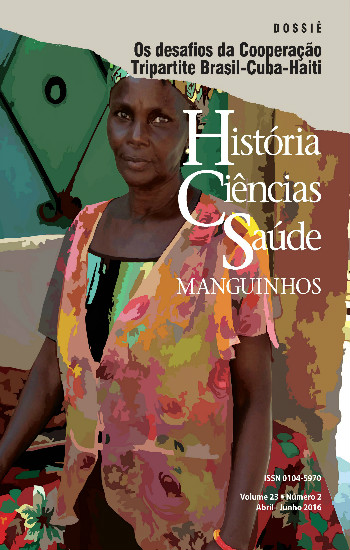Cooperation between Brazil, Cuba and Haiti is the subject of the HCS-Manguinhos magazine’s dossier
Notícia publicada em:
- 16 de Junho de 2016

The inclusion of Haitian immigrants in the politics of the Brazilian health system is the subject of the article that opens the dossier The challenge of the tripartite cooperation Brazil-Cuba-Haiti, published by the magazine História, Ciências, Saúde – Manguinhos (History, Science, Health – Manguinhos) in its second number in 2016. From the perspectives of different fields such as social science and epidemiology, four papers discuss the relations between the three countries in the area of health. The issue also brings 12 other articles of many subjects, ranging from communication and mental health reactions to thinking it on the outback at the beginning of the 20th century.
In the context of the migratory wave that brought a large contingent of Haitian citizens to Brazil from 2010, the first article examines, from an ethnographic study, how the Unified Health System (SUS) responded to the unexpected demand of these new users in the State of Amazonas, where many of them came to the country. Although there have not been detected obstacles to immigrants, the author points out that the lack of direction and coordination of the actors responsible for the implementation of public policies prevented a better effectiveness of access of Haitians to the health system. Another article focuses on a training experience geared to health professionals responsible for epidemiological surveillance and health information systems in Haiti, carried out within the framework of the tripartite cooperation. Also part of the dossier is a study on the participation of the Oswaldo Cruz Foundation (Fiocruz) in a project aimed at the incorporation of health technologies by Haiti. Implemented in 2010 to strengthen the health system and epidemiological surveillance in the country after the earthquake, the tripartite cooperation also was the subject of a study that described practices and perspectives of the agents involved.
This edition also brings an article titled the outback remedied: the clash between goiana elite and the public health thought, 1910-1920, which addresses the local report repudiation by Arthur Neiva and Belisário Penna from its foray into the region to diagnose the State of health of the population. The document highlighted, in particular, the spread of Chagas’ disease. This number also publishes a study on artistic and cultural practices in mental public attention in the metropolitan region of São Paulo. Still in the field of mental health, another article analyses the signs releasing the anti-asylum national day .
In the edition of the magazine papers on the emergence of Aids in the Amazon are also part; the fight against syphilis in Belém do Pará between 1921 to 1924; tuberculosis statistics in Colombia; assistance to families of people with leprosy in Goiás; the cholera epidemic of 1855 in Pernambuco; the incidence of leprosy in Governador Valadares (MG) in the 1980´s; pharmaceutical studies during the Second Empire in Mexico; international cooperation in health at Fiocruz; also an analysis of the first ten editions of the Public Health Journal, published by the University of São Paulo (USP).
About the current political discussion in the country, the letter from the editors of History, Science, Health – Manguinhos (História, Ciências, Saúde Manguinhos) denounce attacks on the Constitution of 1988, with violations of the fundamentals underpinning the democratic State of law and the social gains based on the Letter. Publishers warn of threats that the interim Government program – responsible for the country while President Dilma Rousseff is judged in an impeachment process – represent for the health sector, such as the claim to relieve the Government from fulfilling constitutional determinations of public investment in the sector.
Source: COC/Fiocruz




